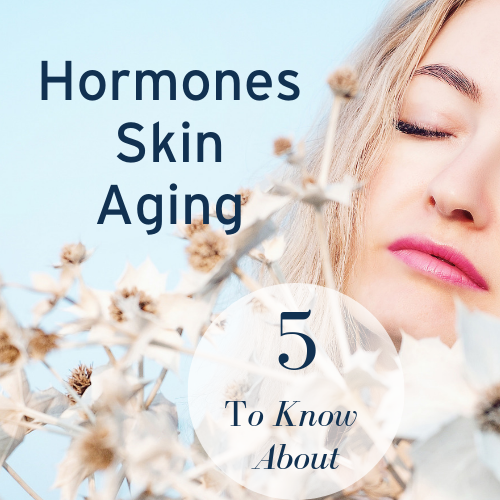When it comes to maintaining healthy, beautiful and radiant skin, hormones, skin and aging are closely linked. While we often focus on sun exposure, environmental stressors and lifestyle, we tend to underestimate the role that hormones play in our skin’s appearance; let’s take a closer look.
Hormones, Skin & Aging
Simply put, hormones are special chemical messengers found in our bodies. They control most of our major bodily functions, including simple needs such as hunger to more complex systems including our reproduction and circulation along with our emotions and moods. We produce many different hormones and all play a role in our health and well-being, including that of our skin.
The 5 main hormones that can impact skin include:
- Estrogen. In women, estrogen, specifically estradiol, is the main sex hormone. It leads to puberty, prepares the body for pregnancy, and helps regulates the menstrual cycle.
- Progesterone. Progesterone is another female hormone. It’s needed to help regulate the menstrual cycle and maintain a healthy pregnancy.
- Cortisol. Also known as the “stress hormone”, cortisol helps the body cope with stress along with other important functions.
- Insulin. Our bodies release insulin in response to the consumption of sugar.
- Testosterone. The main sex hormone in men, it leads to puberty, increases bone density, triggers facial hair growth, and causes muscle mass growth and strength.
Men and women produce the same hormones, but at different levels when it comes to the sex hormones (estrogen, progesterone and testosterone).
Hormones, Skin – The Relationship
Our hormone levels change over time, increasing in the lead up to puberty and declining as we age. All our hormones play a role in our skin’s health, but estrogen and testosterone impact it the most.
- Estrogen. Estrogen is produced in our ovaries before menopause and its production shifts to the adrenal glands after menopause. Levels start to decline in most women in their mid to later 40s, and may begin sooner in some women, especially if they are thin. Lower estrogen levels leads to a drop in collagen and elastin production. Skin ends up being thinner, sagging and wrinkled. Estrogen is also involved in the production of hyaluronic acid (which helps to keep the skin moist) and so skin becomes drier. Stress, lack of sleep, sickness can all impact the adrenal glands and estrogen production.
- Progesterone. Progesterone increases skin elasticity and circulation. Levels may start to decline in women in our mid to late 30s, leaving skin looking dull and lifeless. Menopause, stress, PMS and various other health conditions including infertility are often implicated with low levels.
- Cortisol. When stress levels are high, we release more cortisol. This is not only bad for our health, but also has documented aging effects on our skin. In rats, studies have shown that stress leads to collagen loss for dull, thin, and sagging skin. Anything that beats stress, beats aging too.
- Testosterone. Excessive testosterone (women or men) may lead to acne on the face, chest or back. As women age, testosterone levels tend to increase and estrogen levels decline. This is one of the reasons that some women experience acne at midlife. The opposite occurs in men – estrogen increases and testosterone decreases, leading to skin dryness.
- Insulin. Consuming too many high glycemic foods (refined carbohydrates such as muffins, pastries, white rice, and juice, etc.), can lead to a spike in our blood sugar levels, which prompts the release of insulin. High insulin levels can lead to sleep deprivation and are associated with skin wrinkling. There’s a reason it’s called “beauty sleep”!
Let’s Not Forget Melatonin
Although we’re focusing on the 5 most important hormones when it comes to skin, I can’t leave out melatonin. This hormone is produced in both our brain and skin cells and is known to help regulate our sleep-wake cycles. Melatonin is also a potent antioxidative, which means it can help to protect our skin against damage caused by free radicals. Studies regarding the use of topical melatonin are mixed – the hormone has been implicated in skin darkening because it activates melanocytes, the skin’s pigment cells. If you choose to supplement with melatonin it’s best to take it internally rather than applied topically.
Hormones, Skin – What You Can Do
While aging is inevitable, many of us have the power to age well. The impact of hormones on our overall wellness and on our skin is real, but we can ensure optimal levels by prioritizing looking after ourselves with good nutrition, stress management, regular exercise and adequate sleep.
If you feel that something is off balance, talk to your doctor, your naturopath or your pharmacist. You know your body best and help is available. Don’t hesitate to ask!



